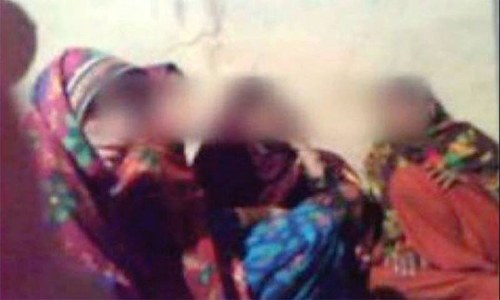The body of Afzal Kohistani — the man who exposed the Kohistan video scandal — was taken for burial to Kohistan on Thursday, after the conclusion of protracted negotiations between his family and police, who have booked Afzal's nephew for his murder.
Afzal Kohistani, was shot dead on Wednesday evening in the densely populated area of Sarban Chowk at around 8:10pm by unidentified gunmen who managed to flee afterwards.
According to witnesses, Afzal was shot multiple times and died on the spot, while three passersby were also injured.
Station House Officer Ghafoor, of the Cantt police station, had yesterday said that Afzal was accompanied by his nephew, Faizur Rehman, who had reportedly also shot back at the gunmen.
As investigations into the incident began, Abbottabad police arrested the nephew, confiscated his pistol and registered an FIR against him for allegedly murdering Afzal and injuring the passersby.
The case against Rehman has been registered under Section 302 (punishment of qatl-i-amd) and 307 (cases in which qisas for qatl-i-amd shall not be enforced) of the Pakistan Penal Code. However, no case was registered against the unidentified persons who had reportedly shot Afzal, according to initial reports.
The development had infuriated Afzal's family member, who objected to the registration of the case against Rehman and staged a protest outside Abbottabad's Cantt police station.
They claimed that the accused had accompanied his uncle for his protection as he had been constantly receiving death threats. The two had come to Abbottabad to meet Afzal's lawyer.
The family demanded Rehman's release, the holding of a judicial inquiry and the provision of protection for the lives of Afzal's heirs: his wife and five children.
Meanwhile, Abbottabad District Police Officer (DPO) Abbas Majeed Marwat said that the bullets casings and blood samples recovered from the scene of the crime have been sent for forensic testing to a laboratory in Peshawar. He said that the test results — which can be expected in two days — will be a deciding factor in finding the culprits behind the killing.
Furthermore, he revealed that Afzal's family has named three persons and police teams have been dispatched to Kohistan to arrest them.
Editorial: Kohistan killings
Haripur Superintendent of Police for investigations, Shah Nazar, was tasked with defusing the situation. He held talks with Bin Yasir — one of Afzal's brothers — and their lawyer, Abdul Wadoos.
Later, Rehman's statement was recorded in the presence of Afzal's brother and lawyer. He is to be produced before the court tomorrow, according to police.
Police's prosecution department explained to Dawn that an FIR once registered "cannot be quashed" and Rehman will have to appear before the court tomorrow, as the law dictates.
Prominent social activist Farzana Bari and former chief justice Saqib Nisar were also consulted by the family members and played an important role throughout the negotiations.
A family member told Dawn that the former chief justice has assured Afzal's family of his support in all legal matters.
The scandal
The Kohistan video scandal made headlines in 2012 when five girls were killed by members of their tribe after a mobile phone video of them at a wedding in a remote village in Kohistan emerged on social media.
The video showed the five females singing and clapping along as two male family members danced. The mixed gathering had taken place in a village located in an extremely conservative part of Khyber Pakhtunkhwa. In the eyes of the locals, the youngsters had violated tribal norms and brought dishonour upon them.
After the video was leaked, a jirga was held by the girls’ tribe which decreed the killing of the girls and the boys under ‘riwaj’ (a tribal custom).
Afzal, the brother of one of the boys in the video, was the one who made the news public, alleging that the girls had been killed on May 30, 2012, on the orders of a cleric who led a 40-50 member tribal jirga. Officials in the area, however, had claimed that the murders did not take place and the girls were alive.
Former chief justice Iftikhar Chaudhary had taken a suo motu notice of the case on June 7, 2012, and constituted a fact-finding mission on July 17 the same year to investigate the case.
The commission went to Kohistan and investigated the matter, producing a report on July 20, 2017, which stated that the girls were alive. Rights activist Farzana Bari, also part of the commission, had expressed doubts at the time that the girls produced before the commission were not the same and some other burqa-clad and veiled girls were, in fact, presented.
Read more: Kohistan video case: Girls declared alive by SC had actually been killed, says Bari
In the ensuing feud, three of Afzal's brothers named Shah Faisal, Sher Wali, and Rafiuddin were killed inside their home on January 3, 2013, by the girls' tribesmen and a year earlier, a child was also killed due to the burning of Afzal's home.
On July 31, 2018, a new case was registered at Palas police station on the Supreme Court's orders.
Four suspects namely Umar Khan, Saber, Mohammad Sarfraz and Saeed were arrested. Upon interrogation, the suspects confessed to killing three of the girls — Begum Jan, Sireen Jan and Bazeega — by firing, saying they had disposed of the bodies in Nala Chorh.
Afzal had been of the firm view that the suspects were lying. “They killed all five girls by severe torture and are not identifying graves as it will reveal their brutality,” he had said at the time.














































